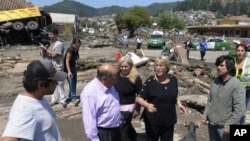Rescue workers in Chile braved aftershocks as strong as 6.9 on the Richter scale to search for survivors amid the rubble on Sunday as the country's president gave the military control over security in the hard-hit city of Concepcion. As the death toll rose to more than 700 in one of the most powerful earthquakes in a century, Chilean President Michelle Bachelet also appealed for international aid.
President Michelle Bachelet called on the public and the private sector in Chile to help with the recovery effort as offers of aid poured in from around the globe.
She said that as Chile faces the aftermath of Saturday's earthquake, the country needs help from all civil and military authorities that are able as well as the private sector. She says the recovery effort would last well into the future.
The 8.8 magnitude quake damaged or destroyed more than a million homes. It snapped bridges and ripped apart roads. The reconstruction work will pose a daunting challenge for President-elect Sebastian Pinera who is scheduled to take office in two weeks.
See map of significant aftershocks
At a supermarket in Chile's second largest city, Concepcion, residents made a rush for supplies. Some said the quake had left them with nothing forcing them to fend for themselves.
Police used tear gas and water cannons to disperse large crowds of looters.
Many Chileans are afraid to return to their homes and are sleeping outdoors as the country continues to be jolted by a barrage of aftershocks.
As the country copes with the aftermath of Saturday's quake, the search for survivors continues.
As many as 50 people are feared trapped in a collapsed apartment building in Concepcion.
Speaking through an interpreter, one survivor says he struggled to escape. "It fell when the earthquake occurred but it took me half an hour to get out. They helped me get out because I was on the second floor," he said.
Chilean officials expect the death toll will continue to rise as recovery teams continue their grim task.
After the massive earthquake hit on Saturday, many Chilean seaside communities were battered by tidal waves. A tsunami swept the seaside town of Talcahuano, seriously damaging port facilities and lifting boats out of the water. Pictures show shipping containers strewn around and flooded streets.
In the coastal city of Constitucion, authorities say there were at least 350 deaths.
North of Constitucion, in the city of Llolleo, one man tells how he, his wife and his father were swept away by a massive surge of water after the quake. He says they were leaving in a truck when the water came. He says something, maybe a branch, hit him in the head and he blacked out. The man says he has searched everywhere for his wife, including local hospitals, but has not found her.
The rest of the Pacific region appears to have been spared from devastating tsunamis. In Japan, coastal residents who were evacuated on Saturday have returned to their homes.
Dozens of nations and international aid groups have mobilized to provide aid to Chile.
Chile is an overwhelmingly Roman Catholic nation. Speaking at the Vatican on Sunday, Pope Benedict XVI said he is praying for the victims and for all of those affected by the disaster.
Chile experiences frequent seismic activity. But Saturday's quake was the country's strongest since 1960, when a 9.5 magnitude temblor set off tsunamis that killed hundreds of people as far away as Japan and the Philippines.




